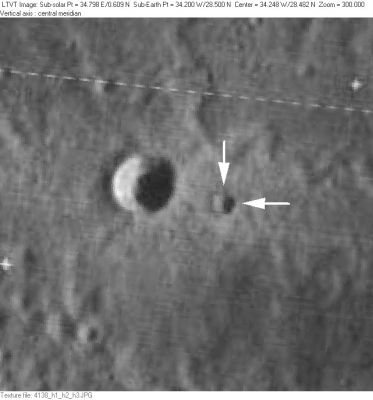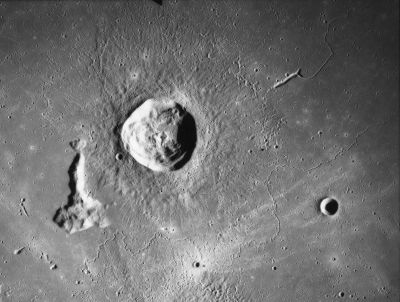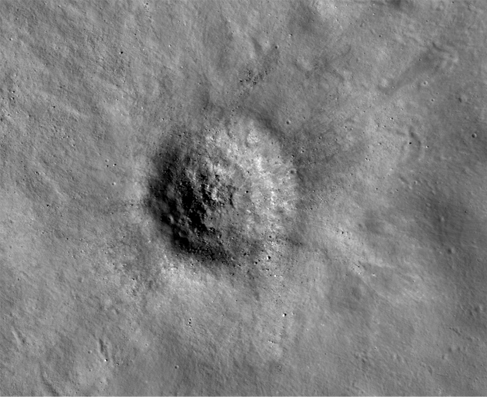Louise
Contents
Louise
|
Lat: 28.49°N, Long: 34.2°W, Diam: 0.64 km, Depth: 0.126 km, Rükl 19 | ||
Middle: Apollo 15 AS15-M2332 Louise and Samir are near the bottom of the frame, at the center of the region of bright ejecta to the south of Delisle.
Right: LROC NAC image - M104740941LE.
Table of Contents
[#Louise Louise]
[#Louise-Images Images]
[#Louise-Maps Maps]
[#Louise-Description Description]
[#Louise-Description-Wikipedia Wikipedia]
[#Louise-Additional Information Additional Information]
[#Louise-Nomenclature Nomenclature]
[#Louise-LPOD Articles LPOD Articles]
[#Louise-Bibliography Bibliography]
Images
LPOD Photo Gallery Lunar Orbiter Images Apollo Images
- Apollo 15's orbital Hasselblad photograph AS15-92-12460 shows a close-up of both Samir and its small nearby companion Louise.
- Research: Danny Caes
Maps
(LAC zone 39B2) LAC map Geologic map LM map LTO map Topophotomap
Description
The smaller of a pair of craters situated to the SW of a bend in the Diophantus Rille. The larger and much more prominent crater 2.5 km to the west is Samir. Although the contours in Topophotomap 39B2/S1 indicate a continuously descending bowl shape with a slightly raised lip, the shadows in the Apollo Metric image suggest Louise has a low central peak. - JimMosher JimMosher
Wikipedia
Additional Information
- IAU page: Louise
- Depth data from Kurt Fisher database
- Westfall, 2000: 0.26 km
- In comparison to the current official IAU data listed in the title line, the position and dimensions in the older coordinate system of the topophotomap as read by LTVT were: Lat: 28.473°N, Long: 34.214°W, Diam: 0.7 km. The depth listed in the title line was read from the highest point on the rim to the "lowest" point on the floor (which, as indicated above, may be the summit of a central peak).
- Both Louise and Samir are so small that through Earth-based telescopes what is seen is primarily the dusting of bright ejecta that blankets this area -- most readily visible at high sun angles as in the Apollo metric and Clementine images. It is not entirely clear if the bright ejecta were produced by Louise or Samir, but they seem centered on the latter. - JimMosher JimMosher
- Moore et al, 1980 lists the "small crater between Delisle and Diophantus" as a thermal anomaly crater, implying youthful age - - but which is the anomaly crater, Louise or Samir?
- Included in ALPO list of bright ray craters
Nomenclature
- Louise is a generic French female name. It is not meant to honor any particular person.
- According to NASA RP-1097, Louise is a Minor Feature whose name was originally intended only for use in connection with Topophotomap 39B2/S1(on which it is plotted).
- In addition to Louise and Samir, the other Minor Features labeled on Topophotomap 39B2/S1 are Isabel and Walter.
- All these names were among the 95 Topophotomap Minor Feature names approved by the IAU in 1976 (IAU Transactions XVIIB).
- Much confusion about Louise exists because in Antonin Rükl's popular Atlas of the Moon only a single crater is plotted at this location, and it is labeled "Louise" with a special arrow pointing to it. Similarly, in the popular Virtual Moon Atlas freeware program, only a single name is given in this region, and that name is "Louise". Rükl's reason for choosing the name Louise is unknown. In all likelihood, the crater he drew and labeled is Samir.
LPOD Articles
Bibliography
Named Features -- Prev: Lorentz -- Next: Louville
This page has been edited 1 times. The last modification was made by - tychocrater tychocrater on Jun 13, 2009 3:24 pm - afx3u3


